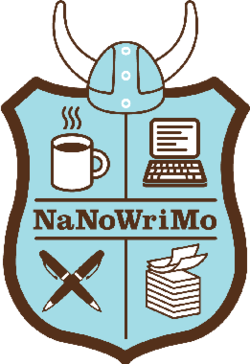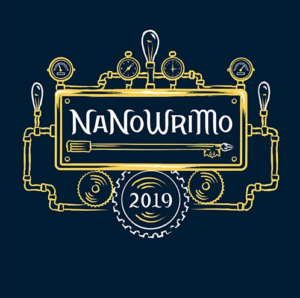November is National Novel Writing Month (NaNoWriMo for short), and for the unaware, that means thousands of writers around the world are endeavoring to write an entire novel (approximately 50,000 words) by the end of the month. To many, this initiative seems foolish if not impossible. As someone who has participated in (and “won) NaNoWriMo twice, in addition to knowing several others who boast a much more impressive record, I can not only tell you that writing a novel in November is not only possible, it is actually quite attainable, even for the inexperienced.

This logo inspires writers each year.
The first time I participated in NaNoWriMo, I was a high school senior. I had determined that writing was a passion of mine, and I wanted to write a story that challenged common notions (in Young Adult literature) and also built on some of my existing interests. This ultimately led to the planning and drafting of my second novel which I entitled “Starlight.”
I’ll certainly write about my first novel and its many, many drafts in the future, but we’ll focus on the second and third for now.
“Starlight” followed a group of five young adults with superhuman origins and abilities (starring Jade, a cyborg), but rather than paint them in a heroic light, these individuals were imprisoned. This was not a case of mistaken identity or injustice (well, not entirely). The protagonists were all guilty, though, as to be expected, the circumstances that contributed to their crimes were complex. They were classic examples of the notion that simple explanations are rarely sufficient, even if we’d prefer to settle for them.
At the heart of “Starlight” was the central conflict between the protagonists, the head of the prison, and a mysterious third party that came in the form of living embodiments of celestial bodies. Jade and her colleagues had to face obstacles in the form of independent adversaries, orchestrated coups, and the consequences of their own actions. In the end, they proved themselves to be more than their mistakes, which is a lesson I hold closely. I often write stories that bear some resemblance to the complicated nature of life and boast reflections of my own moral compass. And of course, with dual concentrations in literature and creative writing, such a literary approach to writing comes naturally.
My second NaNo attempt came just last year, and yet again, I chose to tell a story about super-powered individuals. “A Flash in the Dark” depicted the lives of twin sisters Emery and Sage in a world where superpowers were common and those with them were controlled by the state. Anyone with useful abilities was recruited for the government’s purposes of law enforcement, community service, and public order. Sage was a late bloomer and developed the ability to conjure and control electricity as a teenager. Emery, while gifted academically, never acquired such powers.
The nature of this novel was intriguing, especially as my writing process often entails not knowing everything about a story until I write it. Capturing the unique relationship between Emery and Sage (because of their difference in experiences, priorities, and goals, among other things) proved to be both challenging and rewarding. I didn’t want to solely focus on Sage because she was the one with superpowers; I was determined to explore both of them in order to understand who they were, what they wanted, and what motivated them.
Because of this aspiration, I found Emery to be more captivating than Sage at times, which was genuinely delightful. She was by no means average, but in a society that not only hinges on the supernatural abilities of a select few but also distributes highly-advanced technological support for individuals who lack them, Emery could have easily slipped into someone who was complacent, bored, and dull.
Instead, Emery’s goals (which, first and foremost, related to protecting her sister and tangentially prioritized the dismantling of a corrupt system) were more dynamic, driven, and frankly, a bit delusional than I had ever expected. Writing “A Flash in the Dark” was a unique experience that lent itself to a worthwhile exercise in character exploration and plot development. (Additionally, the title was taken from a song of the same name by the band Katzenjammer, which I highly recommend.)
It has consistently surprised me that the subject matter of both of my NaNoWriMo attempts have revolved around “superheroes.” I’ve never been particularly fond of the genre, though I’ve watched enough Marvel/DC films and shows to have a working knowledge of the way those stories work. Outside of NaNoWriMo, I have never written a story that could be classified within the superhero genre, which makes the matter more confounding.
Despite my efforts of reflection, I’ve yet to understand this. It may be coincidence. It may stem from insecurity; perhaps, rather than attempt a novel in a preferred genre (such as magical realism) and risk failure or dissatisfaction, I settled with something familiar and relatively neutral in my perspective to encourage experimentation and avoid disappointment. Even though these novels were outside my usual wheelhouse, I still enjoyed writing them, and I certainly learned new things (about writing, about my style, about myself) in the process, which is invaluable.
Whatever the reason that compelled me, the decision to write stories like “Starlight” and “Flash in the Dark” for NaNoWriMo has served me well, resulting in victory both times. To “win” at NaNoWriMo, the ultimate goal is to write at least 50,000 words before the end of the last day in November. With my victory in 2019, I even ordered a t-shirt to commemorate the occasion.

Accomplishing this goal feels incredible. At times, I’ve gotten inside my head, doubted my writing skills and my drive, but in the end, I’ve succeeded—even if the story isn’t quite finished by the time I reach the 50k benchmark.
This year, based on certain life circumstances as well as the socio-political climate and still-ongoing pandemic, I’ve decided to participate in NaNoWriMo in a different way. Rather than strive for 40,000 words (which would likely serve to heighten my stress levels in an unproductive way), my goal is simpler: write every day for myself.
There are a few ways I can fulfill this.
- Write content for Medium and/or my website (like this!) about writing, literature analysis, digital marketing/SEO, etc.
- Write book reviews. This is especially pertinent as we are nearing the end of 2020 and I am 6 books away from completing my Goodreads’ Challenge.
- Write creatively. As part of my November goal, I am hoping to a) finish some WIPs that have fallen stagnant this year and b) work on revisiting/rewriting a story I started in high school about winged humanoids, destiny, and, of course, love. (The rewrite will be sapphic, so I could not be more excited).
I may not be able to officially “win” NaNoWriMo this year, but 2020 has been an unconventional time; an alternative approach to this challenge seems only fair. Making a daily routine of writing for myself will likely be tricky, but I’m determined to see it through. Earning that sense of accomplishment will surely be a positive lead-in to the end of this year.
Check back soon for more posts on writing and literature analysis. I’m planning to write a piece reflecting my thoughts on the “death of the author” concept in the near future.
